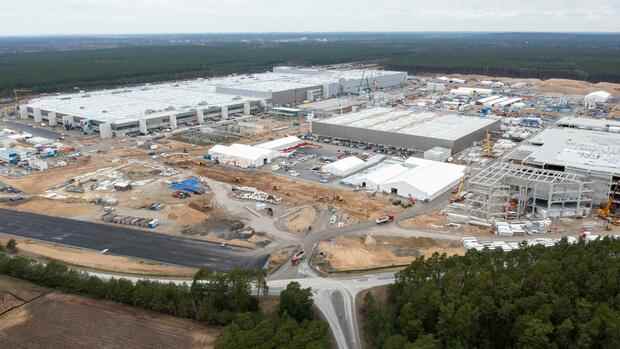If everything goes according to plan, up to 12,000 employees will produce 500,000 vehicles a year in the new Tesla factory.
(Photo: dpa)
Berlin Brandenburg Economics Minister Jörg Steinbach (SPD) has countered speculation that the deadline for the final building permit for the Tesla factory in Grünheide will be delayed due to a legal dispute over the water supply.
Steinbach said on Wednesday in the economic committee of the Potsdam state parliament that he knew that the head of the Strausberg-Erkner water association (WSE), André Bähler, had expressed himself differently. But he sticks to it: “There is no connection with the granting of the final building permit and the outcome of the court proceedings.”
On March 4, the administrative court in Frankfurt (Oder) will hear the lawsuit brought by environmental groups against a permit under water law, which also affects the Tesla plant near Berlin. The court confirmed the relevant information from the Grünheide citizens’ initiative. Up to 500,000 vehicles a year are to be manufactured there. But the final approval of the Brandenburg authorities is still missing.
Green League and the nature conservation association Nabu have filed a lawsuit against a permit issued by the State Office for the Environment on February 28, 2020 for the so-called Eggersdorf water catchment. From the point of view of the two associations, the necessary tests are missing (file number: VG 5 K 469/21).
Top jobs of the day
Find the best jobs now and
be notified by email.
If the water permit is revoked by the administrative court, the water association WSE sees the delivery to Tesla of up to 1.4 million cubic meters per year at risk. The WSE warned in mid-January that “there is a direct connection between the increase in the approval amounts in Eggersdorf in March 2020 and the contract with Tesla” and made it unmistakably clear: “No water – no Tesla”.
Hundreds of objections to Tesla settlement
Like Steinbach, Tesla also emphasizes with regard to the court proceedings that there is “no direct connection” to the company. This insists on statements from the Brandenburg state government, according to which the water supply of the people in the region and the Tesla factory is not endangered.
Steinbach underpinned the assessment by pointing out that a distinction must be made between the approval of the current first expansion stage plus the battery factory and all future expansion stages of the Tesla settlement. “These are two different shoes that also have to be treated differently in terms of water supply,” said the minister.
This means that the 1.4 million cubic meters of water per year also includes the consumption of the battery factory. “For this purpose, the corresponding concept of the automobile factory has been changed so that it remains at these 1.4 million cubic meters for the sum of both companies,” said Steinbach.
The first trees were felled on the Tesla factory site about two years ago, and the car factory is now largely standing. According to the Ministry of the Environment, the approval process will take some time – and even after the decision, Tesla must meet other requirements.
According to Tesla boss Elon Musk, the first cars should roll off the assembly line as early as 2021. Hundreds of objections have been raised by environmentalists and local residents, including over the environmental risks they see and the water use at the auto plant and battery plant Musk is planning there.
More: Record speed despite setbacks: How Tesla and Brandenburg outsmarted the bureaucracy

